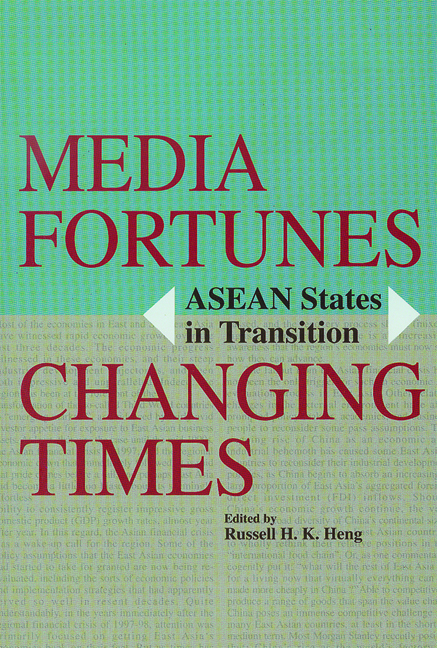Book contents
- Frontmatter
- Contents
- Foreword Wolfgang Möllers
- Acknowledgements
- Contributors
- Introduction
- Chapter 1 Media in Southeast Asia: A Literature Review of Post-1980 Developments
- Chapter 2 Cambodian Media in a Post-Socialist Situation
- Chapter 3 Industrialized Media in Democratizing Indonesia
- Chapter 4 Indonesian Television and the Dynamics of Transition
- Chapter 5 The Impact of Economic Transition on the Media in Laos
- Chapter 6 The Media and Malaysia's Reformasi Movement
- Chapter 7 Myanmar Media: Meeting Market Challenges in the Shadow of the State
- Chapter 8 Singapore: Media at the Mainstream and the Margins
- Chapter 9 Offending Images: Gender and Sexual Minorities, and State Control of the Media in Thailand
- Chapter 10 Vietnamese Media in Transition: The Boon, Curse, and Controversy of Market Economics
- Index
Chapter 9 - Offending Images: Gender and Sexual Minorities, and State Control of the Media in Thailand
Published online by Cambridge University Press: 03 November 2017
- Frontmatter
- Contents
- Foreword Wolfgang Möllers
- Acknowledgements
- Contributors
- Introduction
- Chapter 1 Media in Southeast Asia: A Literature Review of Post-1980 Developments
- Chapter 2 Cambodian Media in a Post-Socialist Situation
- Chapter 3 Industrialized Media in Democratizing Indonesia
- Chapter 4 Indonesian Television and the Dynamics of Transition
- Chapter 5 The Impact of Economic Transition on the Media in Laos
- Chapter 6 The Media and Malaysia's Reformasi Movement
- Chapter 7 Myanmar Media: Meeting Market Challenges in the Shadow of the State
- Chapter 8 Singapore: Media at the Mainstream and the Margins
- Chapter 9 Offending Images: Gender and Sexual Minorities, and State Control of the Media in Thailand
- Chapter 10 Vietnamese Media in Transition: The Boon, Curse, and Controversy of Market Economics
- Index
Summary
INTRODUCTION
In recent decades the legitimacy of new highly-visible cultures of male and female homosexual and transgender minorities in Thailand has been much debated by the country's academics, bureaucrats, medical professionals and politicians. Thailand does not criminalize homosexuality or transgenderism and there is no history of state surveillance or intervention in individuals’ private sexual lives to enforce conformity to dominant heterosexual norms. However, since the 1980s there has been considerable debate about the public representation of gender/sex minorities in the electronic media, with the controversy reaching a new peak in 1999 when then prime minister Chuan Leekpai unsuccessfully attempted to keep images of kathoey (male-to-female transgendered characters) out of the public domain.
These changes took place against a background of a significant transition in Thailand. Politically, Thailand has moved from a militarycontrolled authoritarian regime of the early 1970s to the multi-party civilian democracy of the 1990s. This passage of time encompasses a long history of resistance to military dictatorship, the end of Cold-Warperiod justifications for state authoritarianism to counter communist “subversion”, and the economic ascendancy of the commercial and industrial middle classes since the Thai economic boom (1987–1997). They have all contributed to a progressive empowerment of the civil society sector and its growing success in media battles with the entrenched conservatism of Thai authorities.
A superficial observation of the public imaging of gender/sex minorities in Thailand provides a study in dramatic contrasts. In Bangkok, pornographic male homosexual publications, videos and VCDs are sold openly, but illegally, in tourist areas such as Silom Road and Patpong, as well as in the city's homosexual red-light districts such as Saphan Khwai. However, non-pornographic movies realistically representing homosexual and transgender lifestyles have at times been banned. This chapter will examine several much-publicised cases where films, television programmes and public events such as transgender beauty contests have been defined as “indecent” (lamok) or “pornographic” (po) and banned, or attempted to be banned. The above interventions contrast with instances of state sufferance (such as recent screening of Thai-language films about homosexuality) or even promotion (for example, Thai state agencies have harnessed the public's fascination with transgenderism to promote national programs and policies).
- Type
- Chapter
- Information
- Media Fortunes, Changing TimesASEAN States in Transition, pp. 201 - 230Publisher: ISEAS–Yusof Ishak InstitutePrint publication year: 2002



